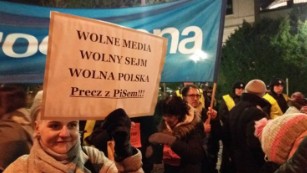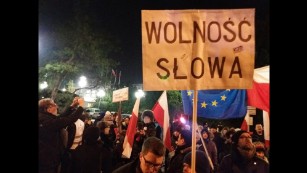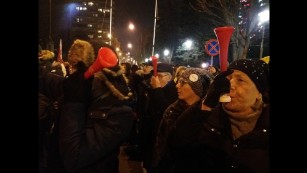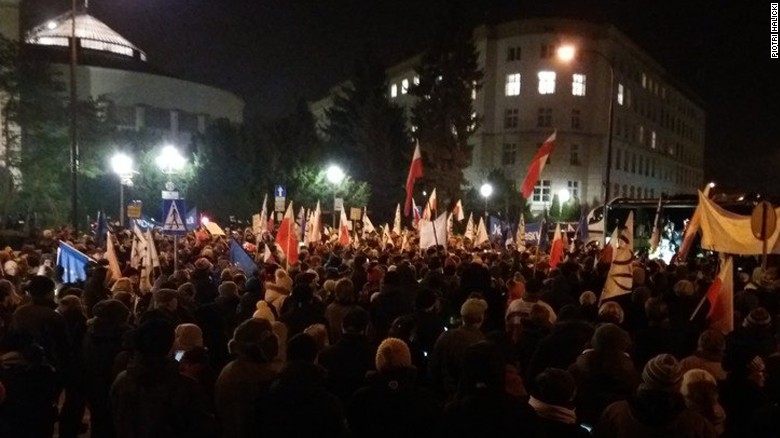Protests grow in Poland as political crisis deepens
A bitter political crisis in Poland worsened over the weekend with heated protests both in and outside the nation's parliament and a swirl of allegations of attempted coups and threats to democracy.
In Poland's lower house of parliament, opposition lawmakers formed a phalanx around the podium, effectively halting proceedings in the chamber in protest over an alleged government attack on press freedoms.
Outside, in freezing temperatures, angry anti-government demonstrators besieged the parliament, preventing politicians from the ruling Law and Justice party from leaving, before police dragged them off the roads.
"In my opinion, yesterday's events were an illegal attempt to seize power," Polish Interior Minister Mariusz Blaszczak said Saturday morning, in reference to the protests in parliament.
Addressing the nation in televised statement Saturday evening, Prime Minister Beata Szydlo placed the blame at the door of her opponents.
"The move by the opposition to ignite extreme political emotions ... has nothing to do with the actual condition of the country," she said. "On the contrary, it is due to the helplessness, the frustration, of those who have lost the power and who have no idea how to convince Poles of their views."

A woman holds a sign reading "Free media, free parliament, free Poland" during Friday's protest outside the legislature.
Jaroslaw Kaczynski, the president of the governing party who is regarded as the man with the real power in Polish politics, said Saturday, "We must not let others terrorize us."
He also spoke of "drawing our conclusions about those who have abused their office," which some have interpreted as veiled threat to the opposition members of parliament who took part in the protest.
The spark for the parliamentary unrest was a government plan to limit media access to the Polish Parliament. Since the country's return to democracy 27 years ago, journalists have had almost unrestricted access to the corridors of power, catching politicians unaware and harassing them with questions.
To many in Poland, this access was regarded as a fine example of Polish democracy -- but to the country's government, which has never had an easy relationship with the media, it was an unwanted privilege that the press, they claimed, had abused. To solve the problem, the government proposed slashing the number of journalists with parliamentary accreditation and creating a media center where politicians could meet the press on their own terms.
This triggered outrage in the Polish media and prompted accusations that the government was trying to silence the press.

A demonstrator holds a sign reading "Freedom of Speech" outside the Polish parliament building Friday.
It also led to the protests in the parliament by opposition lawmakers that, in turn, led to the parliamentary speaker hastily arranging a meeting of Law and Justice politicians in another room, where they then voted through next year's state budget with a show of hands.
The informal nature of the vote sparked claims from opposition lawmakers that they had been prevented from attending the meeting. It also drew prompt condemnation from furious opposition leaders who claimed having a parliamentary vote outside the chamber was both illegal and a violation of the Polish constitution.
Grzegorz Schetyna, leader of Civic Platform, Poland's main opposition party, said Saturday he had reported the vote to the Warsaw prosecutor's office, saying that "all those who broke the law should answer for it."
It was also the first time since Poland shed communist rule in 1989 that a parliamentary sitting had been held outside the chamber of the lower house.
The political fighting over media access and the budget vote is the latest controversy to hit the Polish government. Since coming into power a little more than a year ago, the socially conservative Law and Justice government has launched root-and-branch overhauls of the country's highest court, publically run media, the armed forces and the civil service in a campaign it claims is necessary to modernize the institutions and rid them of bias and corruption.

The protests in Warsaw came after the government's plan to limit media access to lawmakers.
But to its critics, the campaign's real goal is to undermine the basic principles of democracy and try to turn the Central European country into a one-party state once again. The policies have also deepened and widened a bitter political divide in Poland that, at the moment, appears beyond any hope of reconciliation.
The Polish government is also under scrutiny by the European Union for alleged violations of rule of law, while at the same time Poland's hard-won international reputation as a successful and stable state with a buoyant economy has taken a battering.
Protesters have vowed to take to the streets again to keep the pressure on the government.
"We will be on the streets until they are done destroying the country," Mateusz Kijowski, the leader of the Committee for the Defense of Democracy -- the movement that has spearheaded protests since Law and Justice came to power -- told demonstrators Saturday.
But while the government's opponents were quick to claim that the events of Friday and Saturday morning were a turning point in Polish politics, how they will affect the government is unclear. Since coming to power, Law and Justice has come under an almost constant bombardment of criticism over its apparent lack of commitment to democratic rights but at the same time has retained its popularity.
Generous social welfare programs and promises to clamp down on corruption and look after the people left behind by the country's economic progress have appealed to many Poles, giving Law and Justice a powerful position.
The party also enjoys an outright majority in the Polish parliament, so it is free to do what it wants and enact any legislation it deems necessary.
News Courtesy: www.cnn.com











